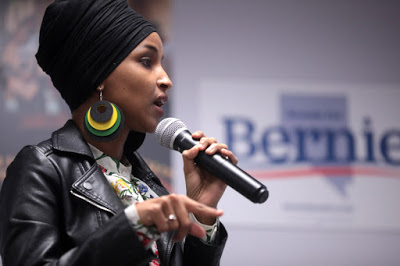Ilhan Omar backs Israel lobby campaign against Iran
 |
| Ali Abunimah 5 May 2020 |
In an unexpected move, Minnesota Congresswoman Ilhan Omar has reportedly signed on to a letter circulated by AIPAC, the powerful Israel lobby group on Capitol Hill.
According to the publication Al-Monitor, the AIPAC-backed letter is aimed at “bolstering the Donald Trump administration’s efforts to extend the United Nations arms embargo on Iran.”
That embargo is set to expire in October as part of the 2015 multinational deal in which Iran placed limits on its civilian nuclear energy program in exchange for sanctions relief.
Instigated by American hardliners as well as Israel and its lobby, the Trump administration reneged on and withdrew from the nuclear deal in May 2018.
Since then, the US has ramped up sanctions on Iran, even amid the coronavirus pandemic, inflicting immense suffering on its population.
Among other impacts, the sanctions cause shortages of medicines, leading to avoidable deaths of sick people.
Rather than peacefully resolving international disputes, America’s ruling right wing, and Israel and its hardline lobby, want to see Iran destroyed by sanctions, and if necessary war, to stop the country becoming an effective check on American and Israeli regional dominance.
Under the cover of the coronavirus pandemic, Israel is escalating its direct attacks against Iran-allied forces in Syria.
Protecting empire
In other words, Omar has signed on to a letter whose goal is to preserve and protect American empire and shore up its reactionary and undemocratic client states in the region.
The letter endorsed by Omar asserts that “Iran’s illicit transfers of weapons directly contribute to some of the most destabilizing threats to the United States and our partners in the Middle East such as Israel and the Gulf States.”
The letter also calls for sanctions against Esmail Ghanni, the Iranian general who replaced Qasem Soleimani as head of the country’s Revolutionary Guard. General Soleimani was extrajudicially executed in an American air attack on his convoy in Iraq in January.
Soleimani was on a mission to promote a peaceful rapprochement among regional powers at the time he was killed, according to Iraq’s prime minister.
Under Soleimani’s military leadership, Iran played a key role in defeating ISIS, as well as al-Qaida-linked groups, in Iraq and Syria.
Israel, the United States and certain Gulf states armed and financed al-Qaida in Syria, helping to spawn ISIS, which at one point threatened to occupy Baghdad.
Omar’s signature is all the more baffling, given her forceful criticisms of US sanctions policy against various countries.
AIPAC still influential
According to AIPAC, Omar is among almost 400 of the 435 members of the House of Representatives, demonstrating that despite some erosion in its influence, especially among Democrats, AIPAC can still pull its weight.
In February, Congresswoman Betty McCollum – like Omar a Democrat from Minnesota – denounced AIPAC as a “hate group.” This was perhaps the harshest public criticism of the lobby organization ever uttered by a sitting member of Congress.
AIPAC also waged war against Senator Bernie Sanders, when the progressive standard bearer was seeking the Democratic Party’s 2020 presidential nomination.
Ilhan Omar had endorsed Sanders.
Based on Sanders’ foreign policy record, Columbia University professor Joseph Massad has termed the Vermont senator a “soft imperialist,” a description that could well apply to Omar.
“While the AIPAC letter has some support from some other progressive lawmakers, many other prominent left-wing members have not signed on, including the rest of Omar’s self-styled ‘squad’ – Reps. Alexandria Ocasio-Cortez of New York, Rashida Tlaib of Michigan and Ayanna Pressley of Massachusetts,” Al-Monitor notes.
Inconsistent on embargoes
There’s no statement on Omar’s official website explaining her signature. However, her office told Al-Monitor that Omar “has consistently, for a long time, supported arms embargoes against human rights abusers.”
Her office added that her signature does not mean she “supports [Secretary of State Mike] Pompeo’s tactics or that her position on sanctions has changed, or that she is not in support of the [nuclear deal]. It was just a narrow ask that we couldn’t find anything wrong with.”
It is remarkably naive of such a usually astute politician to think that such purported nuances will cut any ice.
The only headline that her signature is generating – especially in Israeli media – is that she’s backing AIPAC’s position.
And while Omar has signed on to legislation sponsored by McCollum calling for military aid to be withheld from Israeli army units that abuse Palestinian children, she has not called for a total arms embargo on Israel.
Instead of backing a blanket ban on weapons sales to Israel, Omar has advocated for the United States to use the billions in military aid it gives Israel annually as “leverage” to “bring about peace.”
Omar does however support the Palestinian-led grassroots boycott, divestment and sanctions movement to pressure Israel to end its abuses.
To her credit, Omar has also been a strong critic of the US-backed, Saudi-led war on Yemen.
In February 2019, she signed a letter condemning how US weapons supplied to Saudi Arabia and the United Arab Emirates have ended up in the hands of al-Qaeda-linked groups in Yemen.
Yet the AIPAC letter signed by Omar implicitly supports the ongoing war on Yemen. It asserts that Iran “routinely violates” the UN-imposed arms embargo, “particularly in Syria, Iraq and Yemen.”
Alleged Iranian influence in Yemen is one of the main justifications for the ongoing war.
The combined death toll from fighting and disease caused by the US-backed war on Yemen is estimated to have exceeded 230,000 people by the end of 2019.
Omar, it should be recalled, was last year the target of a vicious smear campaign falsely labeling her an anti-Semite after she made mild and accurate observations about AIPAC’s outsize influence on US politics.
Note: This article has been updated since initial publication to add a link to AIPAC’s list of lawmakers who have signed the letter.


